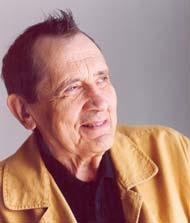|
Rautavaara and Bruckner
Einojuhani Rautavaara: Incantations – Percussion Concerto (2009) (World première)
Anton Bruckner: Symphony No.8 in C minor (1884/1890) (edited by Haas)
Colin Currie – percussion – London Philharmonic Orchestra, Yannick Nézet–Séguin
Royal Festival Hall – 24 October 2009
It’s about time that British orchestras caught up with Einojuhani Rautavaara. He’s been a force in Finnish music for nearly 60 years, from the delightful suite Pelimannit, op.1 (1952), through 8 Symphonies, 3 Piano Concertos, String Quartets, piano music, operas; indeed, I doubt that there’s a musical genre to which he hasn’t contributed – there are now more than sufficient CDs to whet our appetites. This joint commission from the London Philharmonic Orchestra, together with Rotterdam and Tampere Philharmonics and the Baltimore Symphony, is a really good start.
In three quite short movements, Rautavaara’s new Percussion Concerto is beautifully written for the orchestra – the small brass section is only used in the outer movements and their incantatory calls seem to come from afar and act as the first and last words on whatever subject is under discussion. The middle movement is an awe-inspiring dialogue between vibraphone and strings. The writing for the soloist is well thought out, much use is made of marimba and vibraphone but, as I almost always feel with Percussion concertos, when the soloist starts playing rapid phrases on various drums I wonder why the composer has bothered. If he wishes to create some tension the drums can be most useful, but in the middle of a meditative phrase, and this work is full of those, the runs just seem rather embarrassingly empty. This happened a couple of times in this work. Fortunately, there was more than sufficient melodic writing for the soloist to make the part worthwhile.
Rautavaara’s music has ripened over the past 15, or so, years, and his orchestral palatte has become richer – the last two Symphonies and The Book of Visions are well worth investigating – and he has found that less is most definitely more; this work uses a relatively small orchestra, but it is always full of life and colour.
The work was commissioned for Colin Currie and he played it very well indeed, and with such assurance that it was hard to believe that this was its first ever performance. If Nézet–Séguin and his players weren’t quite as confident as Currie they cannot be blamed; their rehearsal time was much shorter than the time the soloist had to learn his part. I hope the London Philharmonic will investigate other works by this interesting composer, it could do no worse than give us the sublime Violin Concerto.
Things took a very serious turn after the interval with Robert Haas’s version of Bruckner’s monumental 8th Symphony. This is a Symphony in four movements, which is typical of the Austro–German Symphonic tradition of the time. What isn’t typical is the playing time of nearly 90 minutes and the very gradual unfolding of the music’s many treasures. It’s a work which doesn‘t give up its secrets easily, and, musically, there are many. The first two movements, a standard sonata form and a scherzo are relatively short, playing for about half an hour, and they display Bruckner’s intense concentration as he makes his way through the peaks and troughs of his own making, the climaxes are hard won, the valley floors barren places. The slow movement plays for about half an hour - an intensely spiritual, not to say at times sexual, experience, and the finale brings everything together in a peroration of high drama and intense passion. Nézet–Séguin proved himself an expert Brucknerian; he never put a foot wrong, allowing the music to speak for itself and moulding the contours of this great work as if it were the easiest thing. This was a towering performance, made all the more memorable by the expert playing of the London Philharmonic. A special evening in the concert hall.
Bob Briggs
|



